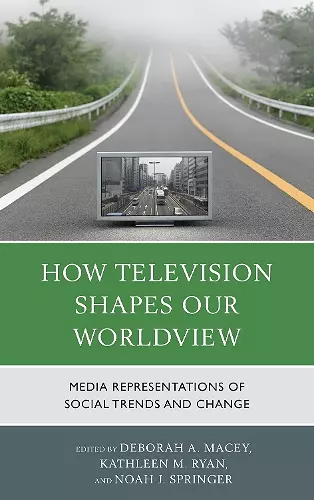How Television Shapes Our Worldview
Media Representations of Social Trends and Change
Deborah A Macey editor Kathleen M Ryan editor Noah J Springer editor
Format:Hardback
Publisher:Lexington Books
Published:15th May '14
Currently unavailable, and unfortunately no date known when it will be back
This hardback is available in another edition too:
- Paperback£58.00(9780739194126)

Over the last half of the twentieth century, television has become the predominant medium through which the public accesses information about the world. Through the news, situation comedies, police dramas, and commercials, we learn about the world around us, and our role within it. These genres, narratives, and cultural forms are not simply entertainment, but powerful socializing agents that show the world as we might never see it in real life. How Television Shapes Our Worldview brings together a diverse set of scholars, methodologies, and theoretical frameworks to interrogate the ways through which television molds our vision of the outside world. The essays include advertising and public relations analyses, audience interviews, and case studies that touch on genres ranging from science fiction in the 1970s to current “reality” television. Television truly provides a powerful influence over how we learn about the world around us and understand its social processes.
Macey, Ryan, and Springer have compiled essays that examine how television has molded visions of the outside world since the mid-20th century. Since its emergence as a popular form of mass communication, television has served as a primary means of information and cultural storytelling. Through the medium, in all its various genres, narratives, and cultural programs—news, sit coms, police dramas, reality shows—viewers learn about a world they might never see in real life. Pointing to the increasingly fragmented television landscape, the editors organized the essays—all by media scholars—into six main sections: 'Not Necessarily the News,' which considers current affairs; 'Boy (and Girl) Meets World,' the intersection of television with individual lives and social trends; 'America's Most Wanted,' television’s role in perpetuating good and evil; 'The More You Know,' television’s role in social change; 'The Voice,' power and authenticity; and 'Futurama,' which offers a glance at the future. The essays analyze a wide range of shows—Glee, That Girl, Rhoda, Friends, House M.D., M*A*S*H, Welcome Back, Kotter; the numerous theoretical frameworks and methodologies presented suggests that the audience is specialists. The book is a good read. . . .Summing Up: Recommended. Graduate students, researchers, faculty. * CHOICE *
The authors use diverse methodologies, theoretical frameworks, and genres of television to enhance the scholarly application of this book. The editors succeeded in organizing an array of essays on the ways in which television both influences and is influenced by social trends.... This book would be a helpful addition to a course on mass media, the history of television, or diversity in the media... The variety of methods and theoretical frameworks used make the book helpful for a class that is exploring ways to approach the study of media and communication. * International Journal of Communication *
Because of its range of texts, themes, and critical approaches, this potpourri of essays enriches television scholarship. The ambitious collection examines commercial considerations, such as advertising and audience reception, and social issues, such as images of good and evil. It is a persuasive analysis of information distribution and predictions about what lies ahead in television, which remains a singularly important conduit for dominant and alternative cultural narratives. -- Jan Whitt, University of Colorado Boulder
This book brings together diverse and highly respected scholars to help demonstrate the powerful influence of television, an increasingly fragmented and fractured media in contemporary culture. It explores institutions, audiences, and cultures through multiple methodologies and theoretical frameworks, offering fascinating new insights into how television molds our perceptions of the world and influences our action within it. -- Kathleen German, Miami University
ISBN: 9780739187043
Dimensions: 237mm x 162mm x 37mm
Weight: 794g
448 pages